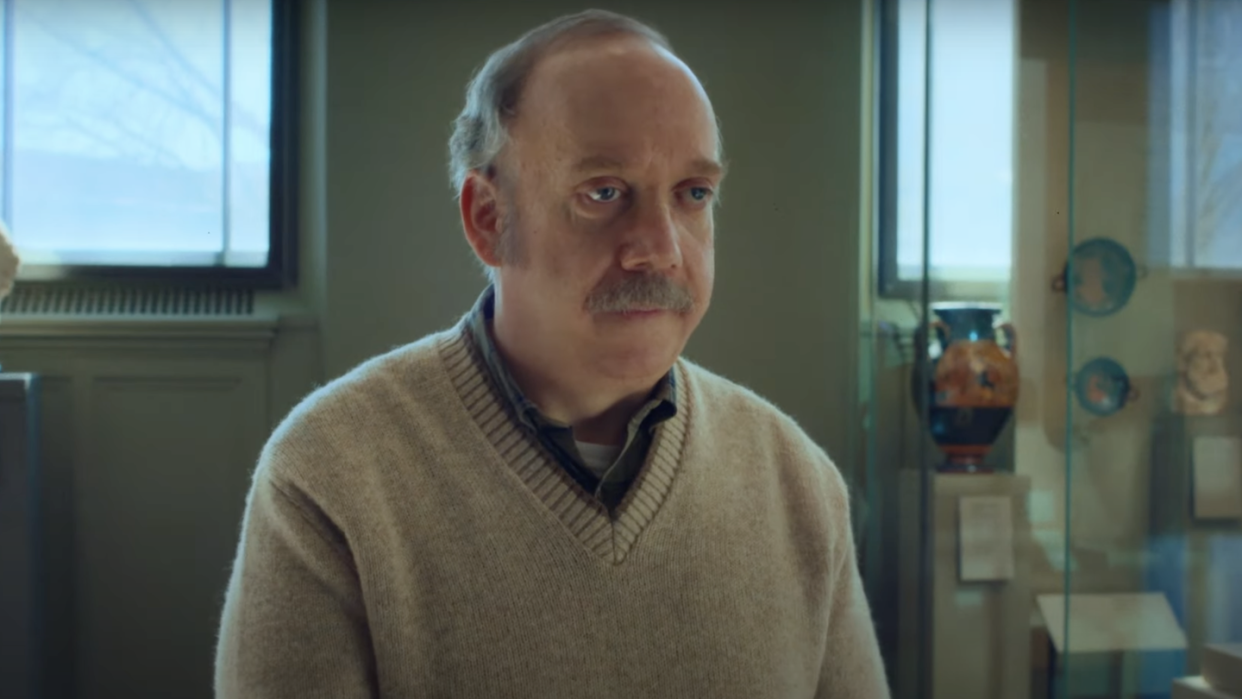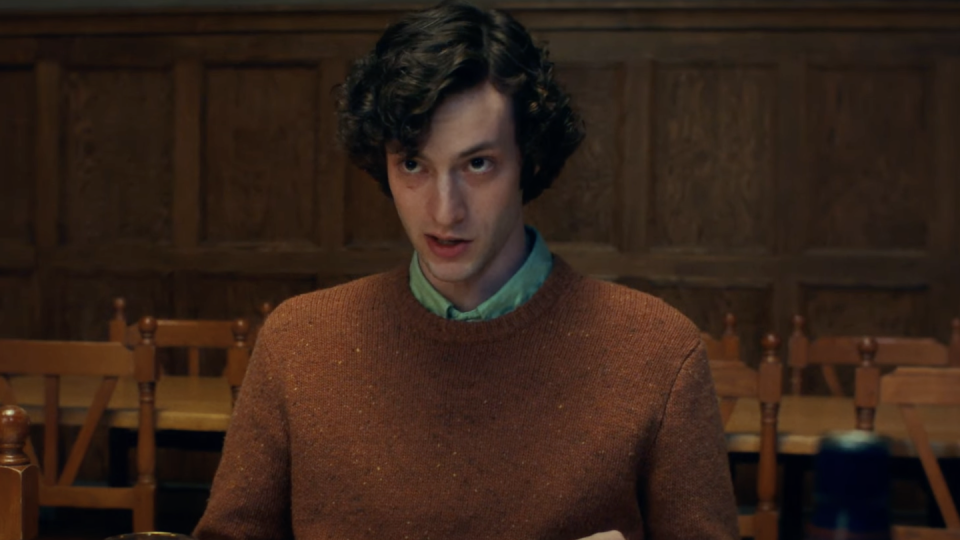'The Holdovers' Is Tender, Triumphant, and Incorrigibly Corny

- Oops!Something went wrong.Please try again later.
- Oops!Something went wrong.Please try again later.
Veteran director Alexander Payne’s latest film, The Holdovers, takes place in a circa-1970 world we’ve seen on screen countless times before: bell bottoms, brown corduroy, Vietnam. But its trailer evokes a more recent, if equally gone era—the '80s and '90s when CG, IP, and other soul-killing acronyms were but a gleam in some studio executive’s eye, and character-driven mid-budget storytelling still reigned supreme. (Franchises have always been in the mix, it’s true. But try pitting your Star Wars or Indiana Joneses against 33 increasingly enervating MCU installments, 12 Fast & Furious skid marks, and three—three!—Trolls.)
That three-minute preview, with its shaggy, toodling soundtrack, freeze frames, and old-timey Trailer Man voiceover, seemed to tap into a deeper vein of nostalgia than perhaps its distributor, Focus Features, could have guessed. In three months, it has racked up more than 15 million views on YouTube. (For comparison, the teasers for new releases from indie demigods Yorgos Lanthimos, Sofia Coppola, and Gus Van Sant collectively don’t add up to that).
The movie itself comes steeped in boldfaced vintage signifiers from the jump, literally; Payne renders the copyright notice and various production credits in bygone fonts of long ago, shot on crackling film stock. The effect is immediate and startlingly immersive, plunging viewers into the cosseted snow-globe world of Nixon-era Barton Academy—a fictional New England boarding school where teachers work dutifully to guide and protect America’s future ruling class, and their all-male charges roam its ancient halls and dormitories like rowdy, privileged puppies. Paul Hunham (Paul Giamatti) holds a singular place as their most hated and feared instructor: a fussy, caustic pedagogue who seems to take a certain glee in failing Senators’ sons and sending the rest off to their winter break with severe academic anxiety.
With his putty face, wall-eyed gaze, and bristling mustache, Hunham looks like a late-middle-aged walrus and smells worse, apparently. (It has to do with not being able to process some kind of crucial sweat chemical.) He is hardly the man that the so-called Holdovers of the title—the kids unlucky enough to live too far away, or have too-careless parents—dream of spending a house-arrest holiday with. Yet that is where the gangly, acerbic Angus Tully (newcomer Dominic Sessa), whose peevish persona hides a world of hurt, finds himself when his recently remarried mother abruptly disinvites him from a “family” getaway in Saint Kitts. She needs time alone with her new husband, she explains in a long, distracted phone call. Can’t her only child just… make his own fun?
Angus has no choice, of course—and neither do some half-dozen others unwillingly conscripted into the skeleton crew, including a lonely Korean exchange student, a freckled little Mormon whose parents are away on a mission, and a golden-boy athlete locked in a contest of wills with his captain-of-industry father. When a deus ex machina (or more accurately, a deus ex dad) reduces their body count, all that’s left is Paul, Angus, and Mary Lamb (Da’Vine Joy Randolph), a school cook reeling from the recent loss of her teenage son in Vietnam.
Will these three lonely souls survive the holidays together? Can Paul and Angus get past their prickling animosity and tear down all the emotional ramparts they’ve both worked so hard to build up? Will they learn to grant Mary, a Black woman effectively invisible to most of the people she serves and nourishes every day, her whole humanity? The answer is, for the most part, a safe and satisfying Yes, and Merry Christmas. Alliances will be shifted, long-held secrets revealed, and lives forever altered; Cat Stevens will warble winningly over it all. (The soundtrack also features several sneaky anachronisms, including Damien Jurado and Khruangbin, though you’ll be hard-pressed to know the difference).
Omaha, Nebraska native Payne is best known for observational dramedies that seem to split the difference between stinging wit and wry Midwestern sentiment: the wine-soaked buddy caper Sideways, also featuring Giamatti; About Schmidt, starring Jack Nicholson as a tetchy, untethered retiree; The Descendants, a portrait of midlife grief that somehow managed to make a relatable cuck out of George Clooney. (Political satire, too, often brings out the director’s best and sharpest knives; see 1996’s entirely ruthless Citizen Ruth and 1999’s now-canonized Election.)
Even as it cracks salty jokes about penis cancer and the Peloponnesian War, The Holdovers is often shameless in its emotional endgame and its spelled-out exposition. Amidst a sea of praise for the film, several critics have pointed to a certain cozy self-satisfaction in the narrative, a sense of all the pieces clicking in too neatly and easily. The movie is schematic, essentially, from the first scene: We’ve met each one of these character types before and we know their inevitable arcs, not only from life but from a whole history of holiday wish-fulfillment cinema.

It’s the familiarity of those story beats and the universal feelings they evoke, though, that Payne is playing on, and he appears to have less interest in tweaking the tropes of the genre then in leaning into the warm patina of it all. His camera lingers as lovingly on even the smallest signifiers of the era—a tube of Preparation H on a bathroom sink, a pantyhose ad outside a diner—as it does on his featured players. Scenes don’t just march sequentially from one to the next; they wipe or zoom or jump-cut abruptly, like startled deer.
Giamatti’s Paul, a willful misanthrope with an enduring passion for Marcus Aurelius and Jim Beam (possibly not in that order), steadily evolves from a glowering, stinky punchline into something more nuanced and recognizably human. And the casting of the raw, rangily handsome Sessa, in his first screen role, feels like a welcome respite from the toothy TikTok glibness and improbable abs of most rising Gen-Z movie stars. Randolph, who tends to steal scenes in everything she’s in, from Dolemite Is My Name to Only Murders in the Building, does a lot more with the heartsick, fractious Mary than her pat dialogue implies on the page.
All three of them are grieving the loss of something, whether it’s a loved one or a life that didn’t quite come to be. And it wouldn’t really resonate the same if they could all sit around Wordling the hours away instead of gathering around a boxy TV set to watch reruns of The Newlywed Game, or carpooling to Boston with nothing for company but an FM radio and their own conversations. There is no FaceTime here, only face time, whether they want it that way or not. What lingers after The Holdovers’ last scene—tender, triumphant, incorrigibly corny—is a sense of what we’ve lost in the last few decades, too: mainstream movies that aim to make us feel something more than numbed, dazzled, or disoriented. It may not be the future of filmmaking, but for two hours at least, the past has rarely felt more present.
You Might Also Like

